Key takeaways:
- Intergenerational dialogue enriches understanding by sharing personal experiences, bridging gaps between generations.
- Pro-life advocacy emphasizes the value of every human life, encouraging respectful exchanges to foster compassion and understanding.
- Effective dialogue relies on active listening, creating safe spaces for sharing, and identifying common ground to unite differing perspectives.
- Building partnerships across generations through mentorship and trust enhances creativity and resilience in advocacy efforts.
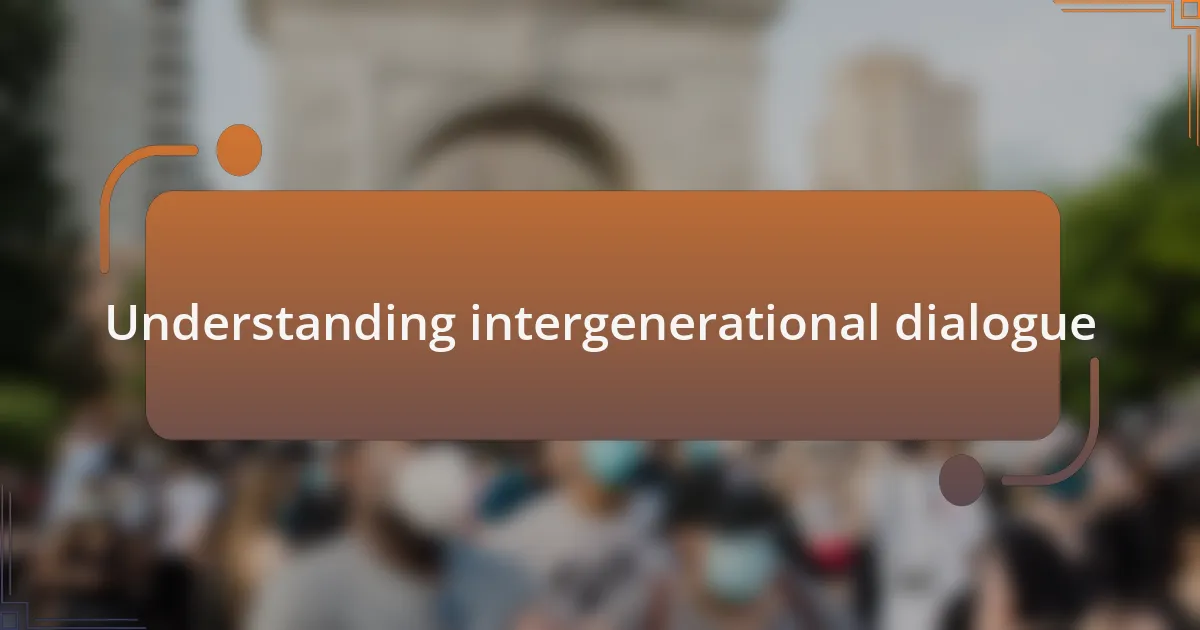
Understanding intergenerational dialogue
Intergenerational dialogue is more than just a conversation; it’s about bridging the gaps between different age groups. For instance, I remember a heartfelt discussion with my grandmother about her experiences during significant historical moments. She shared stories that shaped her values, giving me insights into how our perspectives might differ but also how much we share.
What fascinates me is how these dialogues often reveal underlying beliefs shaped by our unique experiences. Have you ever thought about how your views were influenced by your family’s past? Reflecting on my own upbringing, I realize that understanding my parent’s struggles and triumphs has enriched my perspective on today’s issues, allowing me to connect deeply with their concerns.
Emotional connections often spark when we share our stories across generations. I once attended a community event where young activists engaged with older advocates; the sheer respect and wisdom exchanged were palpable. This interaction not only highlighted our differences but also painted a beautiful picture of unity as we explored how to navigate our beliefs together in a rapidly changing world.
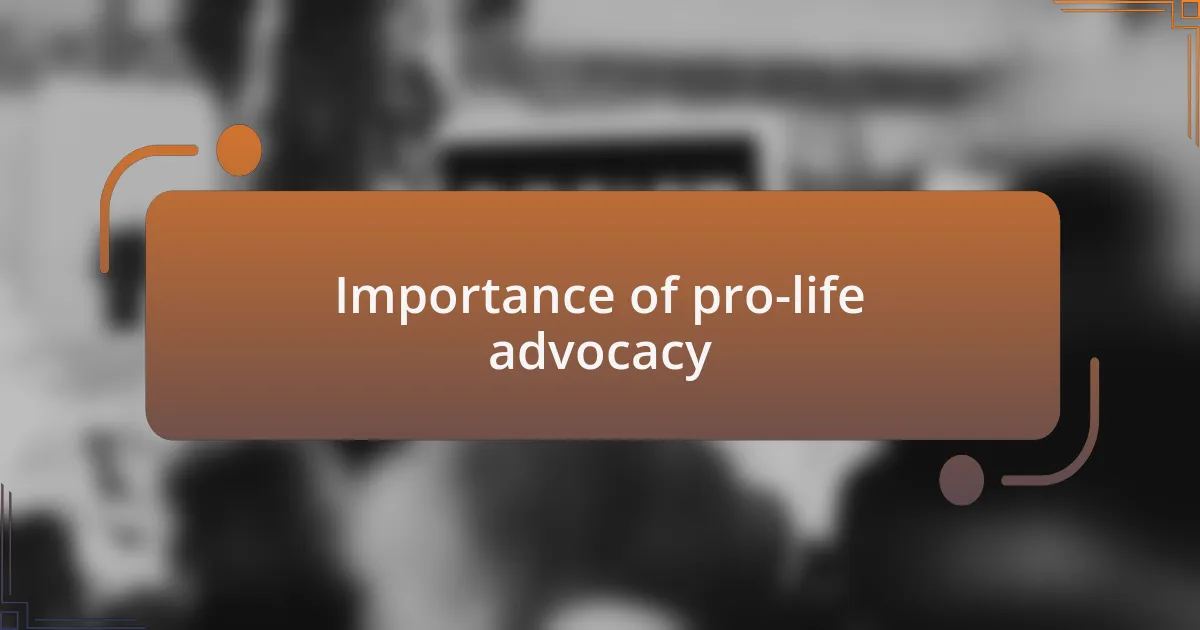
Importance of pro-life advocacy
The importance of pro-life advocacy cannot be overstated; it’s about valuing every human life and promoting a culture of respect and dignity. Reflecting on my volunteer experiences at local pregnancy resource centers, I have witnessed firsthand the profound impact that compassionate support can have on expecting mothers. When I see a young woman choosing life for her child, it reinforces my belief that advocacy is about empowering individuals with choices and resources they may not have known were available.
Moreover, pro-life advocacy serves as a moral compass in society. I often ponder, what message are we sending to future generations if we don’t uphold the sanctity of life? Each discussion I’ve engaged in with fellow advocates reminds me that our collective voices can resonate powerfully—whether lobbying for better healthcare for mothers or pushing for educational initiatives that illuminate the beauty of life.
Importantly, advocating for life fosters an environment where open dialogue can flourish. I remember an eye-opening discussion at a local forum where differing viewpoints clashed, but through respectful exchanges, we found common ground. This taught me that pro-life advocacy is not just about defending a position; it’s about engaging with others in meaningful ways that inspire compassion and understanding, ultimately shaping a brighter future for all.
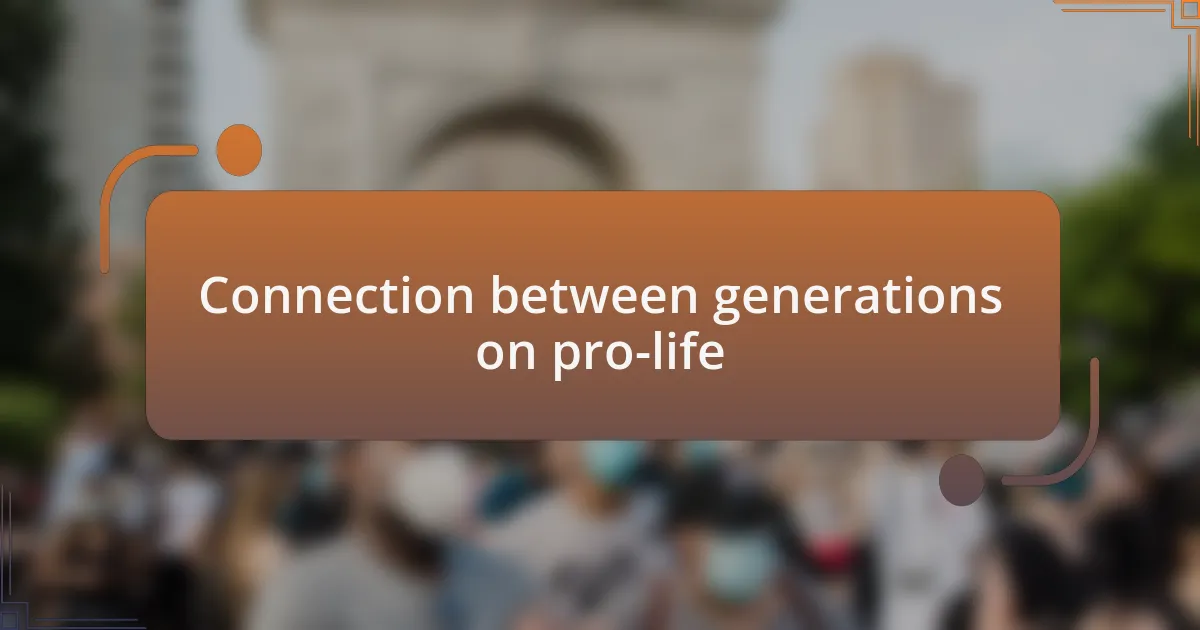
Connection between generations on pro-life
When I reflect on the connections between generations in the pro-life movement, I often think about my conversations with my grandparents. They shared stories from their youth about societal views on life, and I realized how the values of compassion and responsibility have been passed down through the years. This exchange not only deepened my understanding but also inspired me to carry their legacy forward.
I recall a moment during a community gathering when a younger participant asked an elder advocate about their perspective on modern challenges to pro-life ideals. The elder spoke with such passion about the importance of nurturing life, linking it to their own experiences as a parent and grandparent. It struck me how powerful these connections can be; they create a tapestry of wisdom that encourages younger advocates to approach pro-life discussions with both courage and empathy.
In today’s fast-paced world, bridging the generational gap in pro-life dialogue is more critical than ever. I often wonder how we can ensure these conversations continue, allowing us to learn from one another while uniting around shared values. The stories and experiences shared across generations enrich our advocacy, reminding us that each voice has the potential to ignite change and inspire commitment to the sanctity of life.
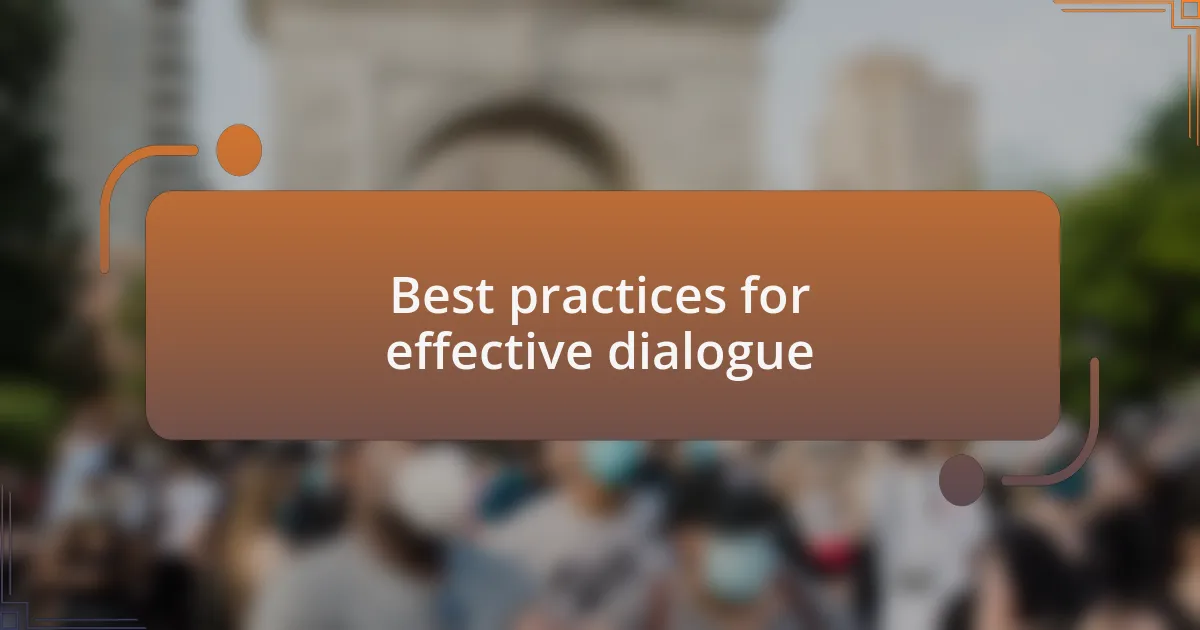
Best practices for effective dialogue
Engaging in effective dialogue across generations requires active listening. I remember a day when I sat with a group of younger activists, hearing their concerns about social media’s impact on the pro-life message. Instead of dismissing their thoughts, I asked questions that encouraged them to elaborate. This not only validated their feelings but also opened up a deeper conversation about how we can adapt our approaches to reach a broader audience.
Creating a safe space for sharing opinions is crucial. During a local pro-life meeting, an elder shared their struggles in advocating for life during challenging political times. The vulnerability in their voice made others more comfortable to express their feelings, too. I learned that honesty fosters trust, and when participants feel respected, they are more likely to engage sincerely.
Having a common ground is essential in intergenerational dialogues. Reflecting on a recent workshop on advocacy strategies, I noticed how discussing our shared mission allowed everyone to contribute. It dawned on me that while our methods may differ, our core values unite us. How can we leverage these shared convictions to create impactful conversations? I believe that by focusing on what binds us rather than what divides us, we can create a more profound dialogue that resonates with all generations.
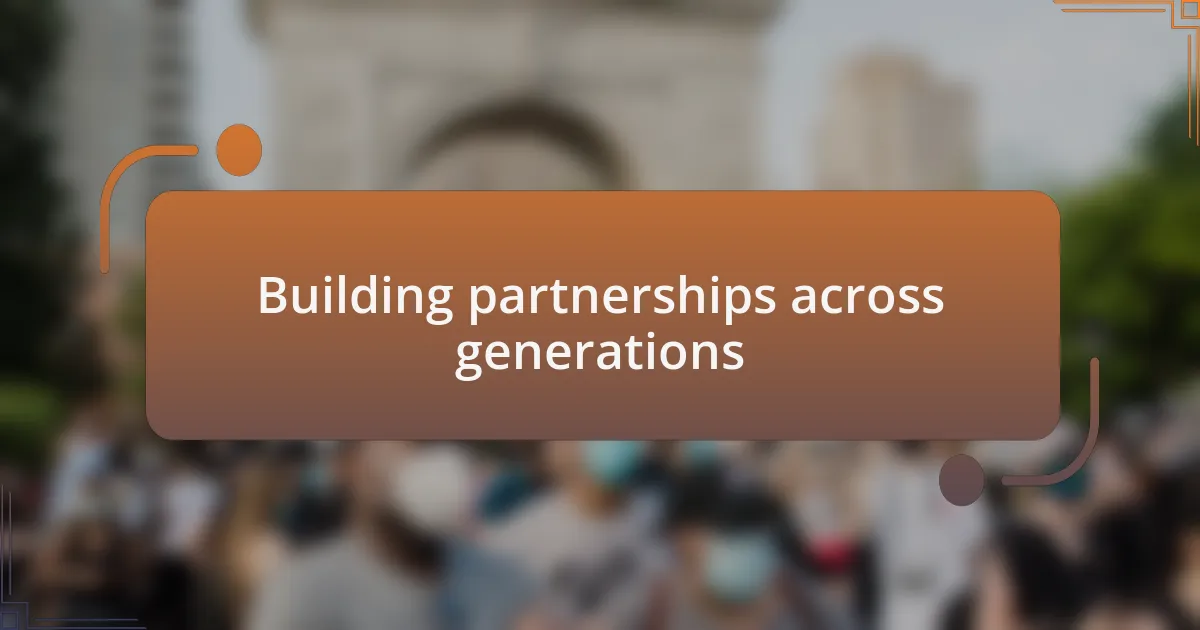
Building partnerships across generations
Building partnerships across generations involves recognizing the unique strengths each age group brings to advocacy. I still remember a powerful moment during a community event when a young volunteer approached me with fresh ideas on how to use technology in our outreach. Their enthusiasm was infectious, and it reminded me how intergenerational partnerships can spark creativity. Isn’t it exciting to think about what we can accomplish when we combine the wisdom of experience with the energy of youth?
Trust is another crucial ingredient in fostering collaboration. I once attended a discussion where older advocates shared their hard-won insights from past campaigns. Listening to their stories, I felt a wave of appreciation wash over me. Each narrative was a lesson in resilience. This openness encouraged younger advocates to share their own challenges without fear of judgment. Can a single conversation like this change the course of our movement? Absolutely. When we share our journeys, we create bonds that transcend generational divides.
Moreover, mentorship plays a key role in building these partnerships. During my volunteer work, I had the privilege of mentoring a high school student passionate about pro-life advocacy. As we exchanged ideas, I found that her perspective revitalized my own approach. This mutual exchange of knowledge not only empowered her but also reminded me that teaching is a two-way street. How can we cultivate more mentoring relationships that benefit everyone involved? By prioritizing these connections, we can ensure that vital wisdom is passed down while simultaneously inspiring the next generation to take up the mantle of advocacy.
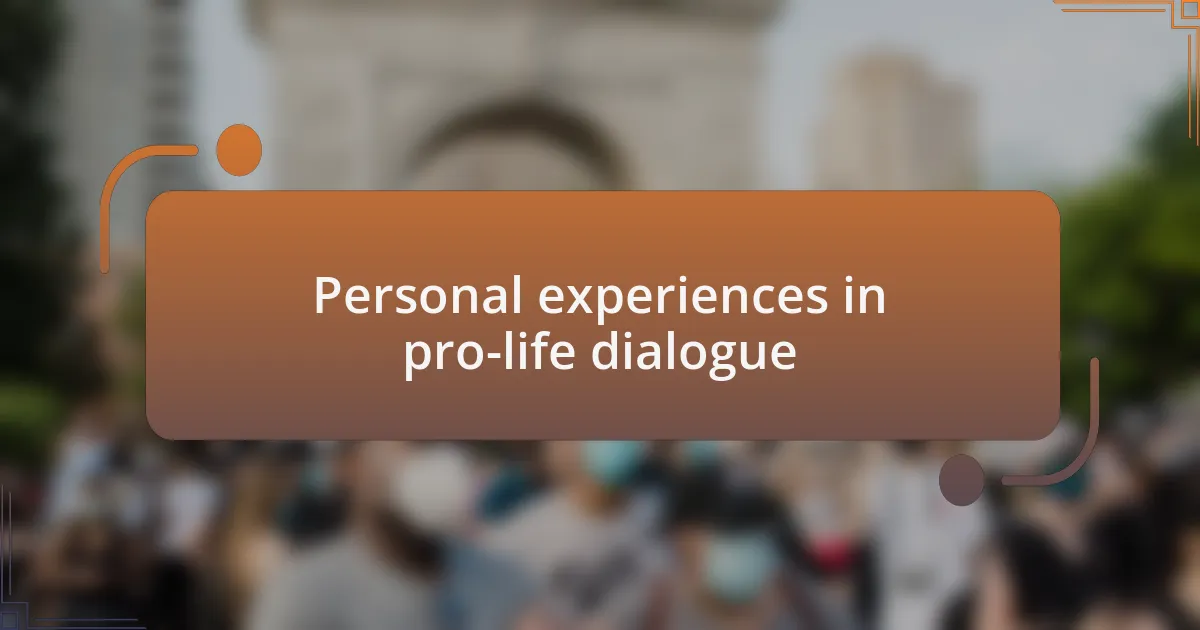
Personal experiences in pro-life dialogue
Engaging in pro-life dialogue over the years has enriched my understanding in ways I never anticipated. One afternoon, while volunteering at a high school, I found myself captivated by a passionate student who boldly presented her views on abortion from her unique perspective. Listening to her, I realized that her experiences shaped her convictions just as mine had. How often do we take the time to truly listen to these voices, recognizing their own journeys?
I recall a heated discussion among my peers where emotions ran high. A close friend shared a personal story about her own family struggles with the topic of pregnancy. Her vulnerability created a safe space for others to voice their fears and beliefs. It struck me, in that moment, that even the most intense disagreements can foster deeper understanding when approached with empathy. Isn’t it fascinating how sharing our truths can not only build connections but also bridge strong opinions?
Conversing across generations in pro-life advocacy has opened my eyes to the power of storytelling. I once facilitated a dialogue session that brought together new parents and seasoned advocates. The stories exchanged were a mix of joy, sorrow, and unwavering hope. I walked away realizing that these narratives shape not only our advocacy but also our sense of community. How can we continue to nurture such dialogues that strengthen our resolve and commitment to life? By celebrating these interactions, we pave the way for a more united front in our mission.
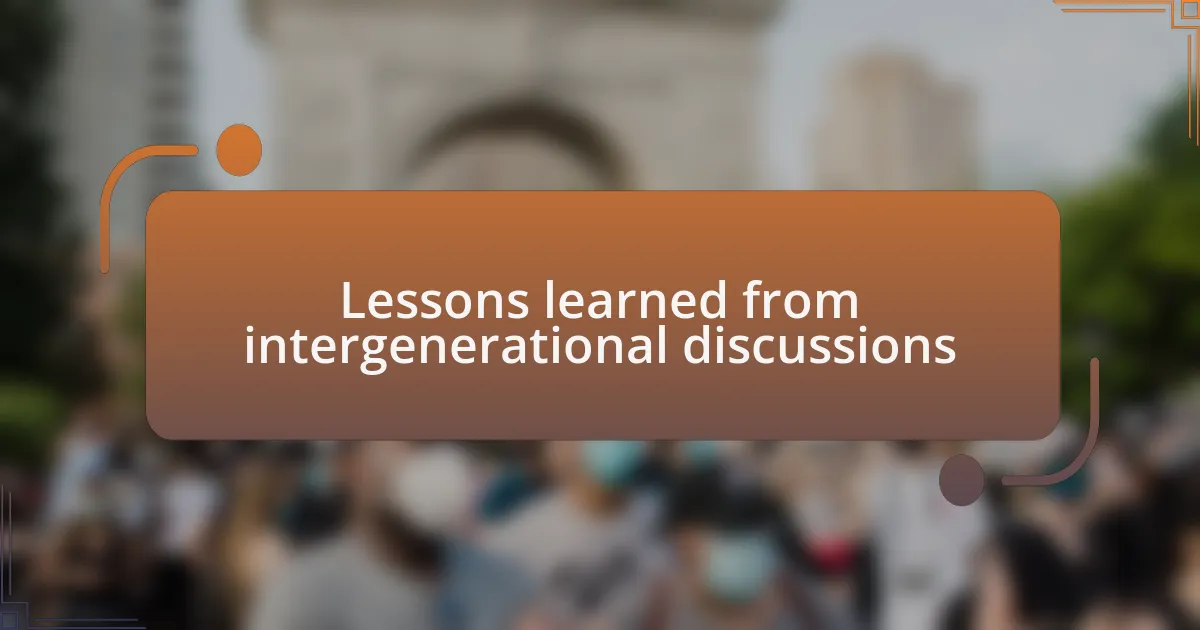
Lessons learned from intergenerational discussions
Engaging in intergenerational discussions has taught me the immense value of patience and understanding. I remember a conversation with an elderly advocate who shared her experiences from a time when resources for women were scarce. Her resilience in fighting for life despite adversity made me realize that every generation carries essential lessons shaped by their unique challenges. How often do we overlook the wisdom that comes with years of experience?
Another profound insight emerged during a community gathering with both younger activists and seasoned supporters. A young mother spoke about her decision-making process regarding her unplanned pregnancy. As she shared her uncertainties, a veteran advocate countered with a story from her own youth, illustrating that vulnerability often breeds strength. It struck me how these dialogues can dismantle barriers and create empathy across age groups. Can we truly appreciate our collective mission without understanding where we’ve all come from?
I’ve also learned that humor can bridge generational gaps in unexpected ways. During a light-hearted exchange, a grandparent quoted a familiar phrase we all chuckled at, which instantly lightened the atmosphere. This exchange reminded me that while our views might diverge, there’s a shared humanity that can connect us. Isn’t it refreshing when moments of laughter spark meaningful conversations about serious topics? These lessons remind us that intergenerational dialogue not only enriches our advocacy efforts but also strengthens bonds of understanding and compassion.